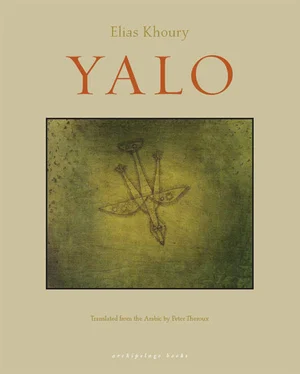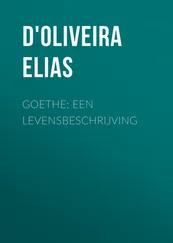“You’re still new at love,” she said. “Enjoy it now and later on we’ll see.”
They started to go to the discothèque once a week, after her game. He would wait for her at the La Gondole Café, while she’d go home to shower, and then they’d head for the darkness of the dance floor.
Once he made love with her this way with the lights on. That was the day she informed him of her decision to marry Isa.
“But he’s much older than you,” he said.
“I’m older than you,” she said.
She asked him to get dressed and go home. He left without having to walk through the streets; he left feeling his tongue. That day he had kissed and licked her breasts all over and discovered the map of her body. But she left him to get married. He went home to his mirror and tried to remember the black widow, burning with the fire of jealousy of a man he didn’t know.
Yalo woke up looking at boots. He reached down below to make sure that his member was there, that the cat had not devastated it. He bent over, kissed the boot, and declared that he was prepared to confess everything.
“Do you confess to the rape?” the officer asked.
“I confess.”
“And that you are agents of Israel?”
“I confess.”
“And that you received orders from Abu Ahmad al-Naddaf.”
“I confess.”
“That you planted the explosives in Antilias and Achrafieh?”
“I confess.”
“That you directed the network in Beirut and Mount Lebanon.”
“I confess.”
“Great. Now that you’ve confessed to everything, we’re going to move you to detention. I’m sure the court will take into consideration the fact that you cooperated with questioning and will find cause for mitigating factors.”
“Thank you, sir.”
“Now you’ll sign your statement, and later on the real sessions will begin.”
“There are still more sessions, sir? I confessed just as you wanted.”
Yalo had said that he wanted to confess to everything to get it over with. He said it was over, and the inside of his mouth tasted like rubber. He said that he was hungry, that he was thirsty.
“I’m thirsty, sir, and hungry, too. May I have something to drink?”
“You ate everything and you’re still hungry?”
“I’m hungry, but whatever you say.”
“You may eat and drink,” the interrogator said, “but first you need to sign these papers. We’ll read your confessions to you, and if you consent, you sign, and then everything’s okay.”
“I’ll sign whatever you want. There’s no need to read them. I’ll sign everything.”
The voice began to read. Yalo heard his name and his father’s and mother’s names. He heard about Ballouna and Shirin, about Emile Shahin and the explosives gang. He heard the names of the victims, and nodded in agreement.
The officer leaned over, handing him some sheets of paper and saying that the real sessions would pass in solitude, since he would be required to write the entire story of his life, from start to finish, omitting nothing.
In the cell, Yalo had been unable to write. He felt that he had fallen into a well and could not breathe. For after the exhausting interrogation sessions that had concluded with his admitting everything, Yalo could no longer remember anything. On top of that he didn’t know what to write, what could he write? In the Paris Métro he had written on a placard and sat beside it like the beggars, under the merciless eyes of the passersby. There he felt the savagery of language. The French words whose meaning he did not understand landed on his head like the blows of a whip. He missed his mother, and he longed for anyone who might speak to him in Arabic, the only language he knew. In that Metro tunnel, Yalo wept when M. Michel Salloum spoke to him in Arabic, he wept because he heard the sounds of Arabic and smelled the scent of Lebanon. But here, in his solitary cell, he felt that he didn’t know how to write.
They read him his confession in Classical Arabic, and the tall young man signed them in dialect. The first time he signed his name in Syriac. The interrogator took the sheet of paper and raised his eyebrows, eyebrows were raised in the Jounieh police station and again in prison when the interrogator visited him several times to rewrite what he had written. This meant that things were not going well, and that the investigation would lead Yalo back to torture.
“What is this?” the officer shouted.
“That’s my signature.”
“What, are you trying to trick us? You think you’re pretty smart.”
When Yalo explained his signature, the officer exploded in anger. “So now you’re going to teach us Syriac? And you said you didn’t know Syriac.”
“I don’t know it, but that’s how I sign my name.”
“No, that’s no good,” the officer said, looking around him and raising his eyebrows, and Yalo was certain that torture was now inevitable, so he said he was sorry for the unintentional mistake and that he was ready to sign as they wanted. The officer looked at the clerk and ordered him to recopy the final page so that Yalo could sign it in Arabic.
Yalo held the fresh sheet of paper in shaking fingers and signed it: Yalo. Once again the officer cursed him.
“What is this shit? Why don’t you write your real name?”
“That is my name,” said Yalo.
“Take him away,” said the officer.
They put him into a truck and took him to a solitary cell, a small room four meters square with an aperture high in the wall covered by an iron grate, and to the right an iron cot with three woolen blankets on it. In the left corner was a green Formica table and white plastic chair. On the table were sheets of white paper, a fountain pen, and a bottle of ink. Yalo was to write his life story at this table.
Had he been a poet, he would have written that he’d fallen into a well of words, that he embraced the night, that his ink was blacker than the night.
Had he been a novelist, he would have written his memoirs in one single swoop and called them Ain Ward. The story would begin with the young boy who would become his grandfather, how he experienced the massacre of his village in Tur Abdin, how his feet led him to Al-Qamishli and from there to Beirut, how a layer of tile became a cohno , and how someone ignorant of the Syriac language became a fervent advocate of this language dying in his mouth.
Had Yalo been a storyteller, he would have sat in prison and told of the fearless Yalo, who’d fought like no one else, who was chivalrous and brave, then had experienced banishment much as his grandfather had, emigrating to France, from which he returned to become a lord among lovers, and, like all lovers, was betrayed.
If he had been.
But he was not.
He was Yalo, a young man trying to read in the whiteness of the paper his story, which he did not know how to tell, his language, which he did not know how to write, and his memory, which he did not know how to provide with a voice. He saw himself as a wild ass lost in the wilderness.
Had his grandfather the cohno not told him that Ishmael was the ancestor of the Arabs and Assyrians, the Christians and the Muslims?
“Yisma’ Allah, Ismail, means ‘God hears.’ God hears nothing but the language of tears. We are the descendants of Ishmael. He baptized us in tears before Christ came and baptized us with water.”
“He shall be the father of a great nation of people and shall dwell in the wilderness like a wild ass,” the cohno said.
“Remember, my boy, this verse is from the Old Testament, from the Book of Genesis. Memorize it, because you too are a grandson of Ishmael, and you will become a wild ass.”
Yalo wrote about this wild ass, tore up the pages, and started again. He immersed himself in the whiteness of the page that stretched before him like a vast desert.
Читать дальше












